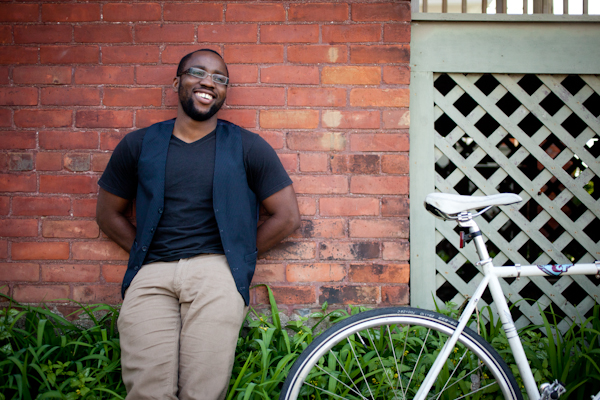Q&A: Tunde Wey on his dinner series, where guests pay different amounts depending on their privilege
At the dinner series Saartj, you pay different amount depending on your degree of privilege. We spoke to chef Tunde Wey about bringing the dinner to Detroit, how being an immigrant influenced his thoughts on racial disparity, and more.

Tunde Wey is undoubtedly a provocative guy. And we’re pretty sure that’s just the way he wants it.
Fortunately, those provocations result in some incredibly thoughtful questions and discussions about race, privilege, and income inequality in America.
Wey, who is Nigerian-born and lived in Detroit for years before establishing a second home in New Orleans, was recently profiled in Civil Eats about his lunch stall, Saartj. The stall’s name comes from Saartjie Baartman, a black South African who was brought to Europe and objectified as a specimen in wealthy homes. Wey says of the name, “The pronunciation is up to the speaker.”
At the stall, which operated in New Orleans during the month of February, patrons ordered their food, then Wey gave a presentation about racial wealth disparity in America. “At the end of his speech,” writes Korsha Wilson for Civil Eats, “Wey presents his guests with two options: White customers can either pay $12 for lunch or the suggested price of $30. Black customers are charged $12 and also given the option to collect the $18 paid by a white patron as a way to redistribute wealth.”
Wey is bringing Saartj to Detroit, from May 2 through 5, as a dinner series. The same principle will apply: the cost of your meal depends on your level of privilege.
But there will be slight differences. The dinners, hosted by Bank Suey, will allow for greater opportunity for discussion, and Malik Yakini of the Detroit Black Food Security Network will give a presentation.
We spoke to Wey about what he learned in New Orleans, the differences between the lunch stall and the dinner, and how being an immigrant influenced his thoughts on racial disparity in America.
Model D: What did you learn from your experiences with Saartj in New Orleans?
Tunde Wey: In New Orleans, I noticed that the emphasis, at least from white people, was on control. Folks wanted to control how much they paid, even when given just two options. There was often some negotiation—some wanted to pay $20, some wanted to give a big tip, which I always declined.
There was often an inclination toward charity. Folks wanted to know where their money was going, who it was going to, which is another form of control. I said it’s going back to folks of color who purchased a meal at the stall. And if this sounded like a validation or vindication of their choice, I countered by letting them know that the people getting it didn’t necessarily need it. It’s being redistributed indiscriminately without merit.
That’s what I’ll be addressing in the dinner series in Ann Arbor and Detroit. The way folks maintain resources and assert privilege is by maintaining and asserting control—control of life outcomes, control of decisions. To a certain degree. I’m not saying they’re omnipotent. And just to be clear, there’s nothing wrong with having control. Wanting freedom over our individual choices is natural. But if you have resources in this country, you can choose where to send your kids to school—you can better their prospects. If you don’t have resources, then you don’t have self-determination in that aspect of your life. And segregation has excluded folks of color from communities where folks are wealthier. Those choices are in fact detracting from the ability of other communities to make similar choices.
Some people’s freedom is impinging on democracy. Negotiating all those individual freedoms and perspectives is important. We should be invested in our democracy, and not in private expressions of freedom predicated on exploitation that continue to promote that exploitation. I want us to begin to think about what democracy looks like, and the way to get there is by having everybody—with a reasonable amount of tolerance—to determine life outcomes and have some opportunity. Because right now, things are uneven to the point that it’s unsustainable.
MD: Obviously Saartj is too small to work as a viable form of income redistribution or reparations. So what is the goal of having different price points?
TW: It’s primarily about challenging people’s beliefs and having a dialogue. It’s about modeling shared actions.
MD: Did anybody who ate at the stall have serious objections to your project? And did you have a dialogue with them?
TW: This series and and the conversations are about ways to transform communities. So yes, I always have a dialogue with people.
One dude refused to pay the suggested amount. I talked to him and he fit all the markers of a person who would pay $30: He was young, liberal, made a lot of money, thought about income disparity among race and gender in New Orleans. He was well aware of the problems and very educated. His refusal was, I think, ideological. But also short sighted.
So we spent 30 minutes talking and, in the end, thought what I was doing was not as effective as electoral politics. He also agreed that there is a spectrum of action from the mundane to significant, but refused to acknowledge that what I did was necessary.
MD: Tell me about the Detroit version of Saartj. What’s different? And how will Malik Yakini contribute to it?
TW: Yakini and the reading reflect the philosophy that I think Detroit, at its center, should be invested in self-determination. He’s doing work that emphasizes localized control. By localized I mean this concept of democracy, where we have all these competing freedoms in a community determining what happens, as opposed to outside influences imposing certain perspectives on that community.
So his work is part of the inspiration for the dinner, and some of the writings will be used in the dinner to ground the conversation. These dinners will feature more conversations—the dialogue will be centered around this idea of self-determination, and the inadequate and ultimately failed ideology of market-based developments in Detroit. The two spring from the same ideology. What does self-determination look like and how can we begin to move all these different stakeholders? The folks currently invested in a conventional investment paradigm, invested in a conventional philanthropy paradigm.
MD: Should people come if they just want to have a great meal?
TW: [Laughs] No. If you want to eat something good, go to any one of the new restaurants popping up. You’ll have more safety and comfort there.
That said, I spend a lot of time preparing the food. I’m in the kitchen cooking four to five days before the dinner. It’s not trivial. Food is the baseline, the foundation, the table to have the conversation.
MD: How does being an immigrant influence your perspective on race and privilege in America?
TW: It definitely inspires the work I do. Immigrants are threatened continuously in all sorts of ways—physically, emotionally, mentally. We have a tenuous position in America.
But there’s also a range of immigrant experiences. Some folks are doing much better than others because we value certain kinds of immigrants over others. I think that self-determination and being able to have control over your life outcomes and being rewarded for efforts is something that a lot of immigrants want. But many, whether they’re documented or not, don’t have that choice. They’re at the mercy of systems.
Saartj takes place at Bank Suey from May 2 through 5. Prices vary.






